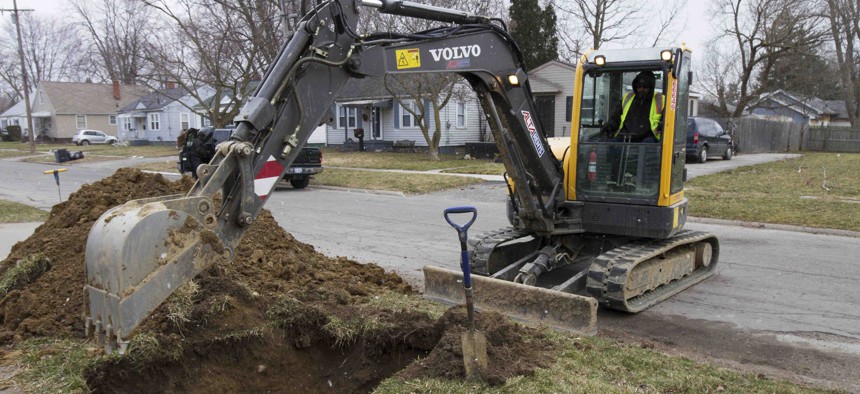Flint Congressman Not Giving Up on Push to Assist Struggling Cities

In a photo from March 10, 2017, work continues on the water replacement lines in Flint, Mich. AP Photo/Chris Ehrmann

Connecting state and local government leaders
Rep. Dan Kildee, of Michigan, believes his efforts could gain new traction in a Democratic controlled House.
WASHINGTON — For over a year now, U.S. Rep. Dan Kildee, a Democrat, has been trying to draw attention on Capitol Hill to the plight of struggling American cities like his hometown of Flint, Michigan.
Now that his party has retaken a majority in the chamber, he sees a new opening for his ideas about how the federal government might ramp up the assistance it provides to these places—communities bedeviled by aging and shrinking populations, strained public finances, old infrastructure, and business closures.
Kildee describes a subset of U.S. cities and towns getting left behind by more prosperous parts of the country. They will require special forms of federal assistance if they are to have any hope of catching up, or continuing to provide adequate public services, he says.
Previously, he’s called for a “Marshall Plan” agenda for these localities, a reference to aid the U.S. provided to help Europe rebuild in the wake of World War II. But he said Thursday the reference was lost on many younger people, and that he’d have to come up with another name.
In any event, he imagines “a really big and bold reset for these most distressed places.”
If his party puts forward major public works legislation next year, Kildee sees it as a logical vehicle for the kinds of proposals he has in mind—things like direct federal aid for infrastructure without local matching requirements, and technical assistance to help places plan for projects.
Kildee added that he doesn’t necessarily envision new programs, but rather a different set of criteria or rules for existing programs for the places with the weakest finances and economies.
“The hope is that it’s just a part of a big infrastructure bill,” he said. But the congressman, who won reelection last week in Michigan’s 5th District with about 59 percent of the vote, also notes: “We don’t have any agreement with anybody to do it that way.”
Flint, in Kildee’s district, was beset by a water crisis that unfolded after the city switched water supplies in 2014 to save money and residents were exposed to lead-contaminated water.
Kildee acknowledges the policies he has in mind are likely to meet opposition in the Republican-controlled Senate, where leaders have been reluctant to embrace plans for sizable new infrastructure spending, even those pushed by the White House earlier this year.
Meanwhile, the federal government faces mounting deficits, exacerbated in part by a tax overhaul the GOP pushed through Congress last year, slashing corporate and individual rates.
“Resources that we were looking at as the way to infuse capital for a national infrastructure bank were going to come from some of the changes that were used in the tax code to fund the cuts,” Kildee lamented.
Top Democrats in the House, he says, including Nancy Pelosi, who is vying again to be speaker, Democratic Whip Steny Hoyer, and Rep. Jim Clyburn, the third-ranking House Democrat, are aware of his efforts on what he’s dubbed the “Future of America’s Cities and Towns” initiative—which kicked off in July of last year and has featured a series of roundtable discussions.
On Thursday afternoon, at the Rayburn House Office Building, Kildee held another one of the roundtables, this one with state and local government analysts from the ratings agency S&P Global, who discussed recent public finance and economic trends.
“The experience of growth is pretty uneven across the country,” Kildee said in his opening remarks. “There’s a subset of communities that seem to almost be immune to the advances of economic conditions. I think of my own hometown of Flint. But there’s many others.”
Bill Lucia is a Senior Reporter for Government Executive's Route Fifty and is based in Washington, D.C.

NEXT STORY: Washington Voters Approve Ban on Local Soda and Grocery Taxes





